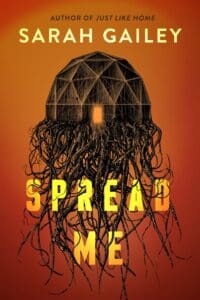Synopsis
Clifford Island. When Willow Stone finds these words written on the floor of her deceased son’s bedroom, she’s perplexed. She’s never heard of it before, but soon learns it’s a tiny island off Wisconsin’s Door County peninsula, 200 miles from Willow’s home. Why would her son write this on his floor? Determined to find answers, Willow sets out for the island.
After a few days on Clifford, Willow realizes: This place is not normal. Everyone seems to be stuck in a particular day in 1994: They wear outdated clothing, avoid modern technology, and, perhaps most mystifyingly, watch the OJ Simpson car chase every evening. When she asks questions, people are evasive, but she learns one thing: Close your curtains at night.
High schooler Lily Becker has lived on Clifford her entire life, and she is sick of the island’s twisted mythology and adhering to the rules. She’s been to the mainland, and everyone is normal there, so why is Clifford so weird? Lily is determined to prove that the islanders’ beliefs are a sham. But are they?
Five weeks after Willow arrives on the island, she disappears. Willow’s brother, Harper, comes to Clifford searching for his sister, and when he learns the truth—that this island is far more sinister than anyone could have imagined—he is determined to blow the whole thing open.
If he can get out alive….
Review
“Dead Eleven” is a captivating debut novel from author Jimmy Juliano. Juliano has had several stories go viral on the “NoSleep” Reddit forum. It’s a slow burn but never boring. A page turner! Juliano draws you into a mysterious island stuck in the 1990s, evoking an eerie sense of nostalgia and an unsettling “cult vibe”. You always want to find out what is actually going on here. Folks are watching the OJ Simpson car chase every evening, listening to Bon Jovi’s “Livin’ on the Edge” on repeat, wearing 90’s attire, and more. This novel reminded me in some regard to the amazing Netflix miniseries, “Midnight Mass” by Mike Flanagan.
There are multiple points of view in this novel. It was very enjoyable to piece everything together as you went along. Some of the chapters are presented as “found footage”. You will read letters, text conversations, interviews, and articles. I found that fascinating to read!
This is not a horror novel that will scare you with just gore. There are a lot of fun nostalgic 90’s moments but truly this is an emotional story about grief and loss. It is extremely effective in that regard. I really felt for the characters. The feeling of grief is something we all have felt in our lives, it’s something we all can relate to. Amidst the chilling array of monsters and demons, the truest terror lies in the raw, haunting grip of human grief.
Juliano skillfully weaves a story that is not just a horror novel, but a poignant exploration of grief and loss, reminding us of the sometimes inescapable and consuming nature of human sorrow.









Leave a Reply